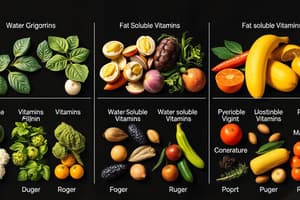Podcast
Questions and Answers
What is the main difference between fat soluble and water soluble vitamins?
What is the main difference between fat soluble and water soluble vitamins?
- Fat soluble vitamins can be stored in the body, while water soluble vitamins are not stored and are easily excreted (correct)
- Fat soluble vitamins are more effective in preventing deficiency diseases
- Fat soluble vitamins are more essential for normal growth and health
- Water soluble vitamins are synthesized in the body, while fat soluble vitamins must be supplied in the diet
Which type of vitamins includes vit. C and B complex?
Which type of vitamins includes vit. C and B complex?
- Water soluble vitamins (correct)
- Fat soluble vitamins
- Carbohydrate soluble vitamins
- Protein soluble vitamins
Which vitamin is known for having two forms, L-ascorbic acid and dehydroascorbic acid?
Which vitamin is known for having two forms, L-ascorbic acid and dehydroascorbic acid?
- Vitamin C (correct)
- Vitamin D
- Vitamin A
- Vitamin E
What is the main source of water soluble vitamins?
What is the main source of water soluble vitamins?
What happens in case of an overdose of fat soluble vitamins?
What happens in case of an overdose of fat soluble vitamins?
Which vitamin is known for its presence in plant sources such as fresh vegetables and fruits?
Which vitamin is known for its presence in plant sources such as fresh vegetables and fruits?
Which vitamin is classified as a water soluble vitamin and is known for its role in energy metabolism?
Which vitamin is classified as a water soluble vitamin and is known for its role in energy metabolism?
Which type of vitamins can be stored in the liver and adipose tissue?
Which type of vitamins can be stored in the liver and adipose tissue?
Which vitamin is known for having two forms, L-ascorbic acid and dehydroascorbic acid, both similar in activity?
Which vitamin is known for having two forms, L-ascorbic acid and dehydroascorbic acid, both similar in activity?
Which type of vitamins requires bile salts for absorption?
Which type of vitamins requires bile salts for absorption?
Flashcards are hidden until you start studying
Study Notes
Differences Between Vitamin Types
- Fat soluble vitamins (A, D, E, K) can be stored in the liver and adipose tissue, while water soluble vitamins (C and B complex) are not stored and are excreted in urine.
- Water soluble vitamins include vitamin C and the B complex vitamins, which are crucial for various body functions and need regular replenishment.
Vitamin C
- Vitamin C is known for its two forms: L-ascorbic acid and dehydroascorbic acid, both of which share similar biological activity and benefits for health.
Sources and Absorption
- Main sources of water soluble vitamins include fresh fruits and vegetables, whole grains, and legumes.
- Absorption of fat soluble vitamins requires the presence of bile salts, which are essential for their digestion and uptake in the body.
Overdose Risks
- An overdose of fat soluble vitamins can lead to toxicity due to their accumulation in body tissues over time, potentially causing serious health issues.
Specific Vitamin Roles
- Vitamin C is prominent in plant sources such as fresh vegetables and fruits, playing a vital role in immune function and collagen synthesis.
- Thiamine (Vitamin B1), a water soluble vitamin, is significant for energy metabolism, helping in converting carbohydrates into energy.
Studying That Suits You
Use AI to generate personalized quizzes and flashcards to suit your learning preferences.




